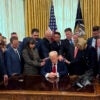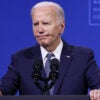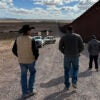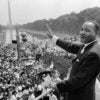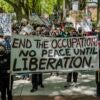Last week, the evidentiary phase of the trial in Perry v. Schwarzenegger came to an end. Perry is the federal court lawsuit in California that claims, in effect, that the U.S. Constitution contains a right to same-sex marriage.
Specifically, the lawsuit challenges the constitutionality of Proposition 8, the November 2008 amendment to the California constitution that effectively reversed a California high court decision redefining marriage to include homosexual unions.
The Daily Signal depends on the support of readers like you. Donate now
If the claims asserted in this lawsuit prevail, the 45 states that recognize marriage as the union of husband and wife could be forced to make marriage genderless. Even the 30 states that have taken the extraordinary democratic measure of amending their constitutions to protect marriage – all of them since 1998 – could be forced to make marriage genderless.
The phase of the case that ended last week included testimony from witnesses called in support of or opposition to Proposition 8. Attorneys from the Alliance Defense Fund, a public interest legal association that has played a key role in defending Prop 8, have posted updates on each day of the trial. The “Day 12” update by ADF Senior Legal Counsel Austin R. Nimocks explains what will happen next in the case:
While the testimonial phase of the trial is finished, the proceedings in San Francisco are not yet complete. Judge [Vaughn] Walker plans to take about a month to review, on his own, the thousands of pages of documents and exhibits that were introduced into evidence during these last two weeks. Then, by Feb. 26, the parties will remit papers which seek to highlight the evidence that they believe support the proposed judgments that they remitted to the court before the trial began. After that, Judge Walker will seek to schedule a time for formal closing arguments.
Although the case likely will not be decided for several months, several serious issues already have emerged from pre-trial briefs filed by the parties and from the examination and cross-examination of the witnesses proffered by each side. One of the most significant issues concerns the argument made by opponents of Prop 8 that proof of moral or religious support for Prop 8 would make the measure constitutionally suspect or invalid. Certain aspects of this issue have been discussed by Ed Whelan in posts to National Review’s Bench Memos blog here, here, here and here.
The issue of the proper role of religion and morality in the same-sex marriage debate bears additional analysis. But for now, it can safely be asserted that, no matter what side of the issue one takes, the question of how to define marriage involves an unavoidable moral aspect. Certain law professors who support same-sex marriage have openly admitted this point. More strikingly, some national GLBT activist organizations have now begun to appeal openly to religion in support of judicial and political measures designed to institute same-sex marriage. The Human Rights Campaign, for example, has a “Religion and Faith Program” and reported last summer that Harry Knox, the director of that program, had visited California “to flesh out a plan with California Faith for Equality to mobilize clergy and people of faith for marriage equality.”
Indeed, one need look no further than the official legislative history of the California same-sex marriage legislation vetoed by Governor Schwarzenegger to learn that “[m]any religious-affiliated groups” have already demonstrated a willingness to get involved in politics when it comes to redefining marriage. Evidence of this sort, which exists in abundance, affirms the understanding, articulated by the U.S. Supreme Court many years ago, that marriage has “more to do with the morals and civilization of a people than any other institution.”
It would be hypocritical for advocates of same-sex marriage to marshal religion in support of judicial and political measures designed to institute same-sex marriage while at the same time arguing that religious or moral support for marriage as the union of husband and wife is somehow improper, unprincipled, or illegal. Parties on both sides of the marriage debate should fully support the principle that voters are “very much within their rights, when casting their ballots, to consider their own moral and religious views about marriage — or any other subject.”
